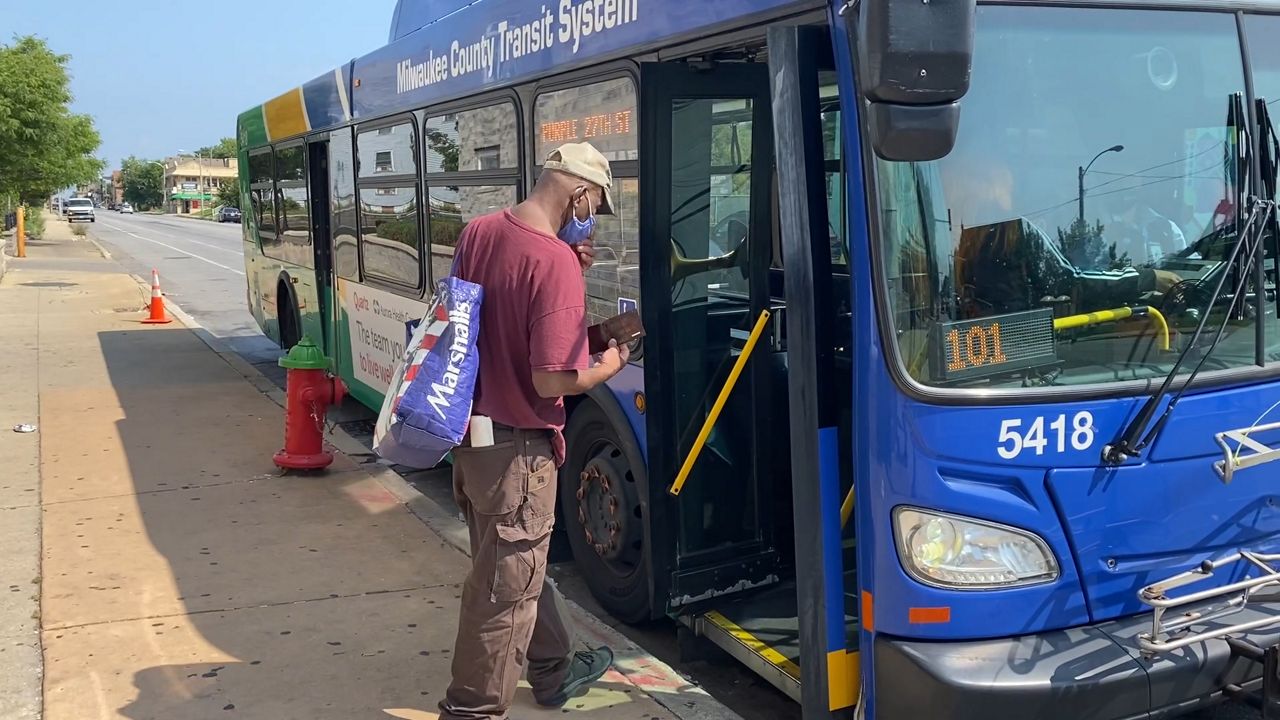MILWAUKEE — At least 20% of Milwaukee County Transit System bus services could be eliminated by 2025, according to the Five-Year Financial Forecast 2024-2028 by the Comptroller’s Office.
That’s in part because MCTS will soon exhaust their federal stimulus, which has allowed services to keep going during the pandemic.
Officials say MCTS is expected to “reach a fiscal cliff” in 2025. Increasing costs, lower revenue collected from fares amid falling ridership, and tax levy funding that’s less than half what it was pre-2017, are to blame.
In order to survive, MCTS would need $31.4 million in tax levy — an increase of $22.7 million.
With the way things currently are, MCTS would be forced to cut 16 routes, plus major segments in four other routes.
“That’s what this has come to. There is nowhere else to cut,” said Milwaukee County Department of Transportation Director Donna Brown-Martin during a meeting Wednesday. “We should not allow MCTS to wither away into a system that only runs busses every 30 to 60 minutes. That inferior level of service has proven to be unproductive, inefficient, and frankly puts more people in their cars and on our roads.”
Routes that would have to be eliminated include Route 11, 20, 22, 28, 31, 33, 34, 52-56, 58, 68, 88 and 92.
The report warns that these cuts would exacerbate labor shortages, with 70,000 fewer jobs available along bus routes.
Cuts would also set back educational and health outcomes in the community, with “devastating impacts to both minority and non-minority residents,” according to the report.
A total of 125,000 people would no longer live by a route — that includes 60,000 people of color, 30,000 people with disabilities and 15,000 senior citizens.
“Milwaukee County residents’ mobility will be severely handicapped if these eliminations come to pass,” said Brown-Martin.
Issues in MCTS funding began long before the pandemic.
A Wisconsin Policy Forum report released in March pointed to large structural issues that have existed for more than 15 years as a reason for some of the current financial struggles. In their 2008 report, the organization warned about the “grim” outlook of the system without “prompt action.”
The most recent Policy Forum report showed that MCTS’s $160.4 million fixed budget in 2023 was funded by four sources: federal aids, state operating assistant, revenue collected from riders and local county revenue.
Part of the federal revenue the system relied on to fill funding holes has been the $191 million in pandemic relief aid. After 2024, that goes away — and in its wake will be a large hole.
Another $24.5 million in federal funds for 2022 came from “5307 funds,” which helps fund route operations for MCTS. The system heavily relies on these funds too. However, these funds will be largely tapped out by 2025.
Ridership has been another contributing factor to the financial crisis. It plummeted by nearly 50% from 2019 to 2021, caused mainly by COVID, according to the report. It has only rebounded slightly in 2022, meaning the system is still losing revenue from fares.
Over the years, Brown-Martin said MCTS has been forced to absorb these rising costs. She called it a “perfect storm” that brewed against stagnant or reduced from the state.
MCTS said they’ve already tried to “chip away” at the fiscal cliff that is looming by eliminating Freeway Flyers, festival and Brewer’s game service and more.
“Frankly, it’s a miracle that we were also able to do this while developing historic and monumental projects such as Bus Rapid Transit,” Brown-Martin said.
Many of those new projects, including BRT, would be derailed amid reductions.
Unlike other cities, MCTS is not supported by a dedicated funding source. Most funding comes only from the state and local funding through a levy on property taxes and a vehicle registration fee.
That’s why leaders are now implementing a #SAVETHEBUS campaign to spread awareness and urge legislators to create a sustainable funding source for the system.
It encourages people to reach out to county executives, use the #SaveTheBus logo on websites and social media pages and register their company for the MCTS Commuter Value Pass program.
“The stark reality is—without significant increase in funding—MCTS will need far fewer bus operators and mechanics starting in 2025. Without your union’s support, that’s the inevitable future,” Brown-Martin said to leaders at the meeting.



